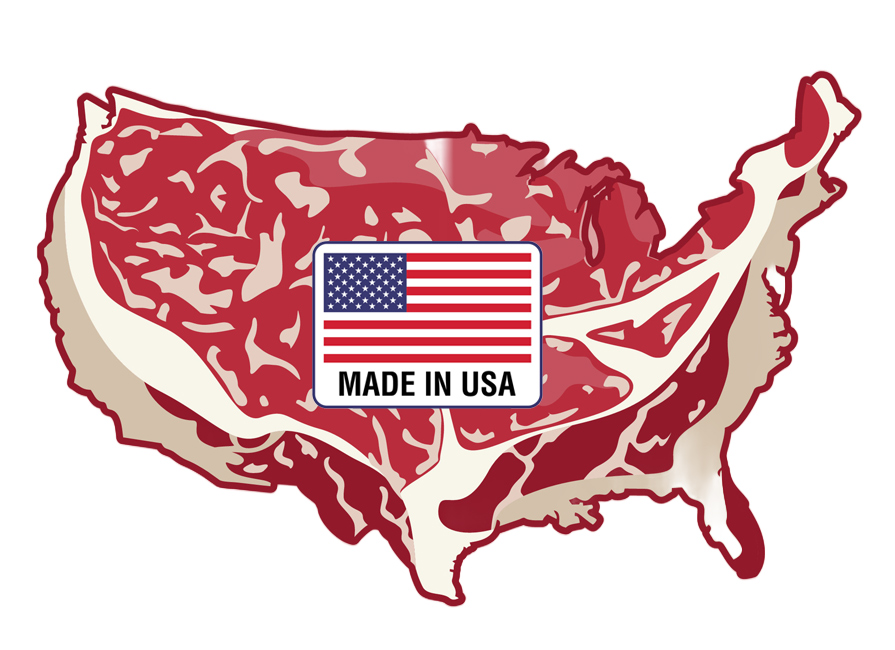In today's increasingly food-conscious world, consumers expect a label to mean what it says—including the…
Big Ag’s Bullying Tactics to Stop Meatless Monday are a Disgrace
Talk about paranoia: I’ve just read that the catering company which runs the various cafeterias on Capitol Hill is stopping its promotion of “Meatless Mondays.” The reason? An intensive meat industry front group, the entertainingly-named Farm Animal Welfare Coalition, has pressurized the catering company to cease supporting Meatless Monday on the basis that the promotion is actually an “acknowledged tool of animal rights and environmental organizations.”
To say I am outraged that the intensive meat industry lobby has successfully managed to bully the caterers on Capitol Hill to stop promoting Meatless Monday because it’s supposedly a campaign run by animal rights activists would be an understatement. And before any of Big Ag’s tiresome trolls try to dismiss me as some vegan fundamentalist, let me make it clear that I am a former poultry farmer and now work as Program Director of one of the country’s leading high-welfare, sustainable farming programs. I also love eating high-welfare, sustainably produced meat. And eggs. And dairy products, too. In fact, if I am honest with myself, I should probably eat a little less for the sake of my own health and the health of the planet. And that, my friends, is the sole purpose of the Meatless Monday initiative. The cafeterias on Capitol Hill weren’t going to stop serving any meat dishes on Mondays: they were simply going to promote non-meat options under the Meatless Monday name to raise awareness of the real health benefits of consuming less meat.
I know that the industrial meat lobby doesn’t like to deal with the facts, but the truth is Meatless Monday isn’t some sinister vegan-driven plot to convert us all into herbivores. A cursory Google search shows that the concept of Meatless Monday actually first came into being during World War One (well before the heady days of industrial livestock farming, cheap meat, and epidemic heart disease as we know today) when the United States Food Administration first coined the terms ‘Meatless Monday’ and ‘Wheatless Wednesday’ to encourage Americans to reduce their consumption of these key staple foods to help the war effort. Sounds like nothing more than plain-old common sense to me.
And so does the Meatless Monday initiative as we know it today. The truth is the Meatless Monday initiative was actually restarted in 2003 as a public health awareness program. Endorsed by an array of public health organizations, such as the Center for a Livable Future (a division of the Johns Hopkins Bloomberg School of Public Health), the aim of Meatless Monday was to highlight the significant health problems associated with excessive meat consumption, cholesterol and heart disease, and was an imaginative attempt to encourage us all to think about reducing our insatiable – and unsustainable – appetite for meat.
Meatless Monday was actually the brainchild of a sprightly gentleman, Sid Lerner. Sid had spent 50 years working in advertising and is perhaps most famous for coming up with the “Please Don’t Squeeze the Charmin” campaign. After a health warning from his doctor about his high cholesterol levels and high blood pressure – largely the result of an unhealthy diet – Sid began to see the devastating impact of our fast food diet all around him. So he decided to do something about it and set up a nonprofit to spread the word. Just in case you were wondering, Sid is neither vegan nor vegetarian. At 81-years-old, he still enjoys eating meat, but in moderation. And that, my friends, is the key.
No one can deny that our addiction to cheap meat has resulted in vast human health, animal welfare and environmental costs. As our diets have changed to incorporate the ever-increasing availability of cheaper meat and dairy products, devastating diet-related diseases – like obesity, heart disease, Type 2 diabetes and diet-related cancers – have developed to near epidemic levels in the U.S. One in three people born in 2000 in the US will develop Type 2 diabetes by 2050. And, according to a World Bank report, diet-related heart disease and stroke have already taken over as the two leading causes of death in low and middle income countries as the Western fast-food diet addiction spreads.
Our relentless demand for cheaper meat has also had devastating consequences for the environment and animal welfare. In the U.S., industrial agriculture is the largest contributor of methane and nitrous oxide, both key greenhouse gasses. More than three-quarters of farming’s nitrous oxide emissions – a greenhouse gas some 310 times more powerful than carbon dioxide – come from the production of artificial fertilizer, used to grow the vast quantities of soya and corn required by the intensive livestock industry.
The Meatless Monday campaign has clearly struck a chord with millions of people across America, and I absolutely support the overall objective of the campaign to improve people’s health and the health of our planet. There are, however, certain groups who attempt to use the Meatless Monday message to encourage people to give up meat altogether. As a proponent of sustainable, high-welfare livestock farming, I know that not all meat is the same. Indeed, it may surprise you to know that pasture-raised or grassfed meat could actually provide some of the much needed solutions to the health and environmental issues that Meatless Monday is attempting to highlight.
Scientists have shown that meat, dairy products, poultry and eggs from animals fed grass-based diets (as opposed to the soya and grain-based diets of intensively-reared animals) are higher in beta carotene (Vitamin A), conjugated linoleic acid, and Omega-3 fatty acids – all believed to be important in reducing cholesterol, diabetes, cancer, high blood pressure and other life threatening diseases.
Pasture-raised and grassfed meat is also better for the environment. Pasture-based livestock systems don’t depend on fossil-fuel hungry feedcrops like soy – or the greenhouse gas-emitting fertilizers needed to grow them. Indeed, the Food and Agriculture Organization states that “On-farm fossil fuel use induced [greenhouse] emissions in extensive [grass-based] systems sourcing their feed mainly from natural grasslands or crop residues can be expected to be low or even negligible in comparison to the [intensive livestock] estimate”.
We also now know that the world’s soils are the largest terrestrial reservoir of carbon, containing three times as much carbon as the atmosphere and five times as much as forests. Remember the millions of bison that roamed the Great Plains? Livestock are a vital part of this natural system and are necessary to manage pastures as ‘carbon sinks’. The point is that regular grazing by livestock encourages grass root growth, which in turn ‘fixes’ more carbon within the soil – a process known as carbon sequestration.
So does the fact that some pro-vegan groups are using Meatless Monday to forward their agenda mean that I want to wipe the campaign off the face of the planet – like the industrial meat lobby clearly wants to? Of course not! If Meatless Monday helps to raise awareness of the very real human health and environmental costs of the over-production and over consumption of intensively-raised meat, then I’m all for it. This is the real reason why the industrial meat lobby is hell-bent on smearing Meatless Monday as an animal rights, vegan-driven campaign. They don’t want people to consider the real message of this common-sense initiative.
I’d like to leave you with one thought: It’s no good if we all cut out meat on Monday’s only to carry on eating poor quality, intensively-farmed meat for the rest of the week. By all means, let’s all reduce our intake of unsustainable, low-welfare, intensively-farmed meat – there’s a good chance that we’d all feel a whole lot better for doing so. But let’s also make sure that the meat we do eat is high quality, pasture-raised meat, such as that certified by Animal Welfare Approved. Committing to such dietary changes every day of the week will mean that you’re not only eating a healthier meat product and supporting family farms that raise their animals to the highest welfare standards in the US – you’re also helping to protect the planet for future generations.



